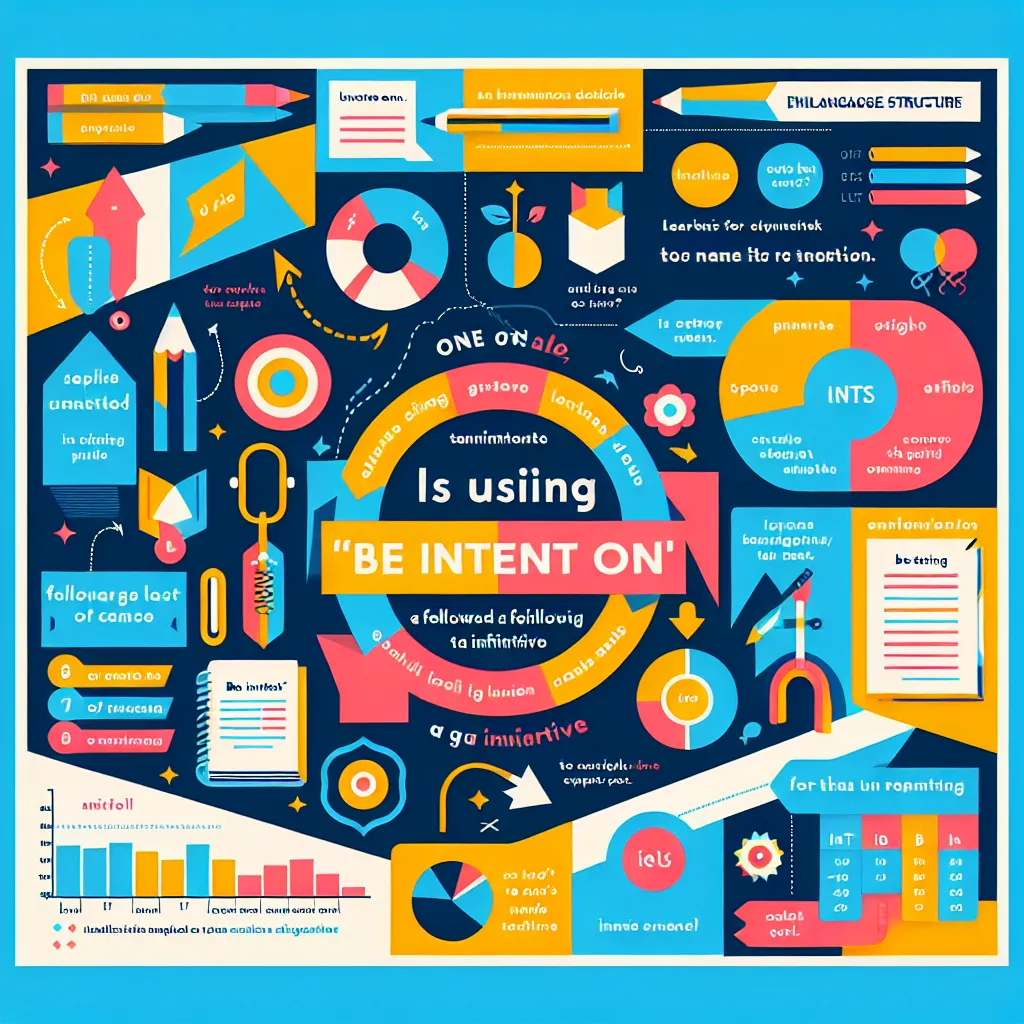The “be intent on + infinitive” structure is a powerful and sophisticated grammatical construction that can significantly enhance your IELTS score when used correctly. This phrase expresses a strong determination or firm intention to do something. Let’s delve into its usage, importance in IELTS, and how to effectively incorporate it into your exam responses.
Understanding the “Be Intent On + Infinitive” Structure
The structure “be intent on + infinitive” is composed of three main parts:
- A form of the verb “to be” (am, is, are, was, were)
- The phrase “intent on”
- An infinitive verb (to + base form of the verb)
Formula: [Subject] + [be] + intent on + [infinitive]
This structure is particularly useful in IELTS Writing and Speaking tasks, where expressing determination and future plans is often required.
Examples in Context:
- “The government is intent on reducing carbon emissions by 2030.”
- “Many students are intent on achieving high scores in their IELTS exams.”
- “The company was intent on expanding its operations globally.”
- “I am intent on improving my English skills before the IELTS test.”
- “Researchers were intent on finding a cure for the disease.”

Significance in IELTS and Usage Across Test Sections
The “be intent on + infinitive” structure is valuable across various IELTS sections due to its ability to convey strong determination and future plans. Let’s explore its application in different parts of the test:
IELTS Writing Task 2
In essay writing, this structure can be used to discuss personal or societal intentions, particularly in opinion or argument essays.
Example:
“Many governments are intent on implementing stricter environmental regulations to combat climate change. While some argue that these measures may harm economic growth, I believe they are necessary for long-term sustainability.”
IELTS Speaking Part 2
When describing future plans or ambitions in the long-turn speaking task, this structure can add sophistication to your response.
Example:
“I am intent on pursuing a career in renewable energy. After completing my degree, I am intent on gaining practical experience in solar panel installation before moving into research and development.”
IELTS Writing Task 1
Although less common in Task 1, this structure can be used in certain graph descriptions, especially when discussing future projections or trends.
Example:
“The graph indicates that the company is intent on increasing its market share over the next five years, with projected growth from 15% to 25%.”
Advanced Usage and Band Score Improvement
To achieve higher band scores in IELTS, it’s crucial to use complex structures like “be intent on + infinitive” accurately and appropriately. Here’s how you can elevate your usage:
Band 6-7 Usage:
At this level, candidates can use the structure correctly but may lack variety or sophistication.
Example: “The government is intent on reducing pollution in major cities.”
Band 7-8 Usage:
Candidates at this level demonstrate more nuanced use of the structure, often combining it with other complex elements.
Example: “Despite economic challenges, policymakers remain intent on implementing comprehensive environmental reforms, which they believe will yield long-term benefits for both the economy and public health.”
Band 8-9 Usage:
At the highest levels, candidates use the structure flexibly and idiomatically, often in conjunction with advanced vocabulary and other complex grammatical forms.
Example: “Having recognized the urgency of the climate crisis, forward-thinking nations are increasingly intent on transitioning to renewable energy sources, notwithstanding the short-term economic disruptions such a shift may entail.”
Common Errors and How to Avoid Them
-
Incorrect verb form after “intent on”
Incorrect: “She is intent on to study abroad.”
Correct: “She is intent on studying abroad.” -
Confusing “intent on” with “intend to”
While similar, these phrases have different structures:- “I intend to travel next year.” (correct)
- “I am intent on traveling next year.” (correct)
- “I am intent on to travel next year.” (incorrect)
-
Overuse or inappropriate context
Be cautious not to overuse this structure or use it in inappropriate contexts. It’s best suited for expressing strong determination or significant plans. -
Forgetting to change the verb form in different tenses
Remember to adjust the “be” part of the structure when changing tenses:- Present: “They are intent on finishing the project.”
- Past: “They were intent on finishing the project.”
- Future: “They will be intent on finishing the project.”
-
Mixing up word order
Incorrect: “On improving his skills he is intent.”
Correct: “He is intent on improving his skills.”
Conclusion
Mastering the “be intent on + infinitive” structure can significantly enhance your IELTS performance, particularly in Writing and Speaking tasks. By using this construction accurately and appropriately, you demonstrate a high level of grammatical control and the ability to express determination and future intentions eloquently. Remember to practice using this structure in various contexts and to combine it with other advanced grammatical forms for maximum impact in your IELTS responses.
To further improve your IELTS grammar skills, you might also want to explore related structures such as “intend to + infinitive” and “plan to + infinitive”. These additional resources can help you build a more comprehensive understanding of how to express intentions and plans in English, which is crucial for success in the IELTS exam.